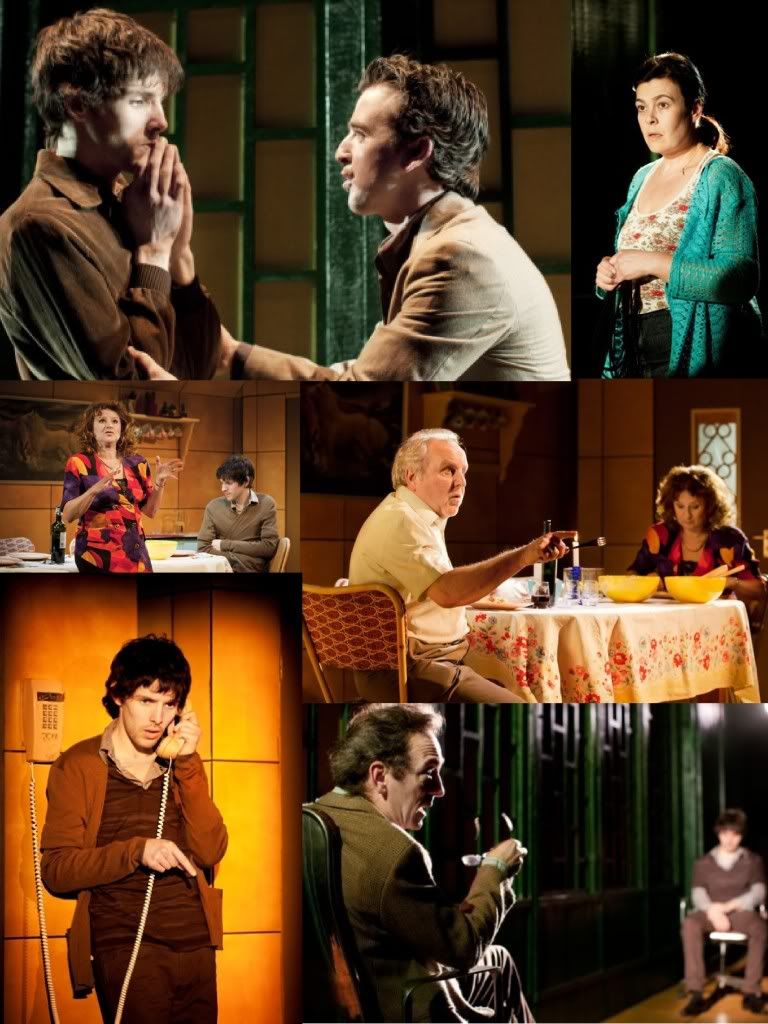This is a really difficult play to review and not just because of the difficult, uncomfortable subject matter. It’s more, in fact, that I came away with the sense that whilst there was a huge amount to enjoy and admire in the production, I was having the difficulty of appreciating that through the shadow of the production I wanted to be seeing. Alas, I fear that sentence makes absolutely no sense.
Perhaps the easiest way to explain is to talk about Colin Morgan. He is one of my favourite young actors in the UK at the moment; I think he has a truly exceptional quality to his performances which make me want to see everything he ever does. But (in what I suspect will be a hugely unpopular opinion) I didn’t like his performance here. I suspect it was more a directorial choice than an acting one as it was a problem I had across the board.
They’ve taken a quirky, odd play and presented it in a quirky and odd way – understandably – the set is bright and the use of hidden cupboards and sliding screens make it seem slightly off kilter. The acting is similar, brash and inventive and not really aiming at reality. These are all directorial choices that make sense and possibly work exceptionally well for others (I loved this sort of thing in The Drunks for example).
Morgan’s Carlos is a prime example of that – right from the first moment we see him, his performance is loud and unusual and unsympathetic and we are left in no doubt that there is something not quite right with Carlos. And from the moment I realised what the play was doing, I couldn’t help feeling how much more interesting and devastating it would have been if the audience had been given room to doubt. If the performance had been subtler, if it had reflected the fact that the play is also very dark and very clever – if we had been left uncertain of how ill Carlos was, how much was his fantasy. If the audience had been allowed in on the doubts that the family was suffering. If we had been left with the vague sensation that the therapist may have been planting memories, but not the certainty.
It was a sensation I was left with through the entire production. With the exception of Anthony O’Donnell’s performance, which was a lot more natural. Unsurprisingly he was my favourite, particularly unsurprisingly as I complete adore him and he’s managed to be my favourite in everything that I’ve seen him in (with the exception of that time the divine Ed Bennett was amazing in As You Like It). As it was his more realistic approach made him by far the most sympathetic character for me, which may have been lost in my imagined alternative production and almost certainly would have robbed the ending of the sheer power it carries here. In contrast to The Heretic, here is a final scene, an epilogue used to shattering effect.
Partly though I was left with the feeling that I didn't know whose eyes I was supposed to be looking through - whether I was seeing this story from the viewpoint of Carlos or his family and I'm not sure whether that was a fault on my part or if the production simply hadn't made that decision. If we are seeing this through Carlos' eyes then the oddness of the production makes sense to me - the bright colours, the people crawling out of cupboards, the layers of noise - but I sort of felt like we were supposed to be seeing this from the eyes of those around him - which made the production choices work less well for me (though I'd be more than willing for another production to change my mind on this aesthetic choice).
In the end though I couldn’t quite shake off the feeling that this was an excellent play that I’d like to see again (and I’ll keep my eye out for more plays by Rozo) but that I had no real desire to head back and see this production another time. However, I certainly didn't regret seeing it and it definitely stuck with me and made me think - which is a success in my book.

No comments:
Post a Comment